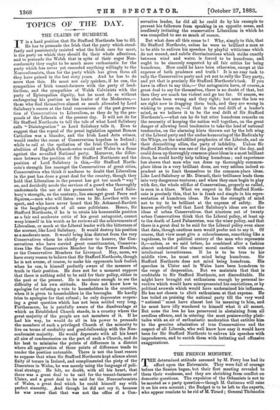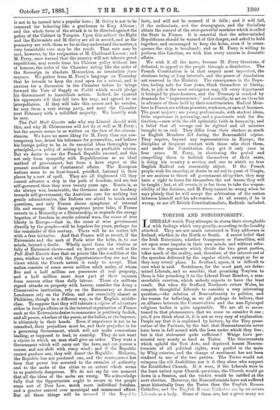THE FRENCH MINISTRY.
THE determined attitude assumed by M. Ferry has had its effect upon the Extremists. They were full of courage before the Session began. but their first meeting revealed to them their weakness, and they are shrinking from conflict on domestic questions. The expulsion of the Orleanists is not to be mooted as a party question—though M. Gatineau will raise it on his own account ; the Budget is to be left to the experts, who appear resolute to be rid of M. Tirard ; General Thibaudin is not to be turned into a popular hero ; M. Grevy is not to be censured for behaving like a gentleman to King Alfonso ;
and the whole force of the attack is to be directed against the
policy of the Cabinet in Tonquin. Upon this subject the Right and the Extremists and M. Grevy are all in accord, and as the
peasantry are with them so far as they understand the matter, a very formidable vote may be the result. That vote may be met, however, by the resignation of M. Challemel-Lacour ; and
M. Ferry, once warned that the country will not tolerate great
expeditions, may recede from his Chinese policy without loss of honour, the order of the Chamber acting like the order of
the Sovereign in absolute Monarchies, as irresistible three majeure. We gather from M. Ferry's language on Thursday that he intends to keep the road open for a retreat, and is anxious for a discussion in the Chamber before he brings forward the Vote of Supply or Credit which would pledge his Government to immediate action. Indeed, he taunted his opponents till they fell into his trap, and agreed to an interpellation. If they will take this course and he recedes, he may form a very strong party, and meet the Chamber next February with a solidified majority. We heartily wish he may. The Pall Mall Gazette asks why any Liberal should wish this, and why M. Clemenceau will not do as well as M. Ferry ; but the answer seems to us written on the face of the circum- stances. We have no more liking for M. Ferry than our con- temporary has, detest his tolerance for persecution, and believe his foreign policy to be in its essential ideas thoroughly un- principled,—a policy of seizing by force on profitable estates. But we desire to see the French Republic succeed, and this not only from sympathy with Republicanism as an ideal method of government, but from a keen regret at the present condition of Continental affairs. The European nations seem to us frost-bound, petrified, fastened in their places by a sort of spell. They are all frightened till they cannot advance a step in the path of freedom, and are less self-governed than they were twenty years ago. Russia is, as she always was, immovable, the Germans make no headway towards self-government, the Austrians care for nothing but gentle administration, the Italians are afraid to touch social questions, and only France shows symptoms of internal life and energy. If those symptoms prove false, if France reverts to a Monarchy or a Dictatorship, or expends the energy begotten of freedom in sterile colonial wars, the cause of true liberty in Europe—that is, the cause of wise government directly by the people—will be hopeless for years, perhaps for the remainder of this century. There will be no nation left with a free initiative. And that France will so revert, if the Extremists and the mob of Paris seize the helm, is, to our minds, beyond a doubt. Wholly apart from the wisdom or folly of Extremist views—and we know quite as well as the Pall Mall Gazette does that on points like the condition of the poor, wisdom is not with the Opportunists—they are not the views which the French nation is ready to accept. That nation consists of some seven million adult males, of whom five and a half million are possessors of real property, and a half million more draw part of their incomes from sources other than daily labour. These six millions regard attacks on property with horror, consider the Army a Conservative institution, rely on the Bureaucracy as decent Londoners rely on the Police, and are essentially almost as Philistine, though in a different way, as the English middle- class. To suppose that they will tolerate a regime of ad zenture either in foreign affairs or in the internal organisation of France such as the Extremists desire to commence is positively foolish, and all power, whether of the purse, or the ballot, or the bayonet, is ultimately in their hands. Even if experience is not to be consulted, their prejudices must be, and their prejudice is for a governing Government, which will not make concessions leading, or supposed to lead, to anarchy. They do not want a regime in which no man shall give an order. They want a Government which will carry out the laws, and can pursue a course, and not shift with every wind ; and if the Republic cannot produce one, they will desert the Republic. Hitherto, the Republic has not produced one, and the consequence has been that power has accreted to the enemies of authority and to the mobs of the cities to an extent which seems to us positively dangerous. We do not say for one moment that all the ideas of the mobs are wrong. We acknowledge fully that the Opportunists ought to secure to the people some sort of Poor Law, much more individual freedom, and 'a greater control over municipal and communal affairs. But all these things will be secured if the Republic
lasts, and will not be secured if it falls ; and it will fall, if the enthusiasts, and the demagogues, and the Socialists obtain the control of the over-powerful machine which is called the State in France. It is essential that the sober-minded Republicans should be warned of this danger, and asked to hold together, and encouraged to keep the helm, even if in conse- quence the ship is becalmed ; and as M. Ferry is willing to perform this function, we wish him every success in domestic affairs.
We wish it all the more, because M. Ferry threatens, if defeated, to appeal to the people through a dissolution. Tbe French Constitution is in that respect most imperfect, the elections being at long intervals, and the power of dissolution not reserved to the Ministry. The consequence is, the Depu- ties, feeling safe for four years, think themselves at liberty, first, to job in the most outrageous way, till every department is besieged by place-hunters, and the Treasury is crushed by demands for "improvements ;" and secondly, to act on ideas far in advance of those held by their constituencies. Radical Mem- bers in France are seldom peasants, workmen, or men of business. The great majority are young professionals, with student ideas, little experience in governing, and a passionate wish for dis- tinction,—men with the old optimistic faith in humanity, and a belief that all wrongs can be righted and all miseries brought to an end. They differ from their electors as much as English Members did during the Beaconsfield riginie. They require, beyond any representatives in Europe, the discipline of frequent contact with those who elect them, and under the Constitution they get it only once in four years. M. Ferry, in shortening the period and compelling them to bethink themselves of their seats, is doing his country a service, and one to which no true English Radical can reasonably object. If the French people wish for anarchy, or desire to set out in quest of Utopia, or are anxious to throw off government altogether, they may have a right to learn for themselves the sad lesson they will be taught ; but, at all events, it is for them to take the respon- sibility of the decision, and M. Ferry cannot be wrong when he says plainly that he will accept the arbitration of the nation between himself and his adversaries. At all events, if he is wrong, so are all British Constitutionalists, Radicals included.



































 Previous page
Previous page